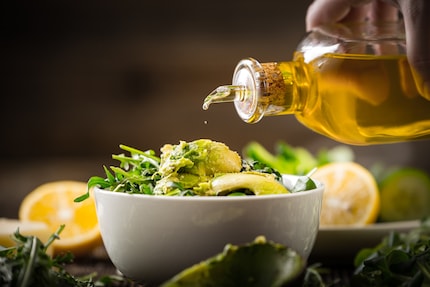
Guide
Which fatty acids are good for you - and which you should avoid
by Anna Sandner

Shimmering green, rare and expensive: what makes avocado oil so special, what role quality plays and why its image often promises more than its content.
Avocado oil sounds like a liquid lifestyle: shimmering green, expensive, supposedly a heart protector - and has long been labelled «Superfood» by influencers. But how healthy is it really, and what's behind the shiny façade?
Unlike many other vegetable oils, avocado oil is not extracted from the seed, but from the flesh of the avocado (Persea americana). It takes around 20 avocados to produce just 100 grammes of oil - they are mainly grown in Mexico, Peru or South Africa. The highest quality variant is cold-pressed, virgin avocado oil. It retains the typical green colour and characteristic avocado aroma. Refined avocado oil, on the other hand, loses many pigments and bioactive plant substances. However, it lasts longer and has a more neutral flavour.

You can only tell to a limited extent whether an avocado oil is really high-quality from the label - there are hardly any binding standards or strict controls to date. A study from the USA shows that cheap avocado oils in particular are problematic: In almost 70 per cent of the products tested, the researchers found either foreign oils - or an oil that had long since spoilt. Anyone looking for quality should therefore not only rely on price or brand, but also look for independent test seals and certified origin.
Practical tip: Avocado oil tends to oxidise relatively quickly. Therefore, store it in a cool, dark place to prevent it from going rancid.
Avocado oil consists of around 70 per cent oleic acid - the cardiovascular-friendly fatty acid that has also earned olive oil its reputation for being particularly healthy. It also contains linoleic acid (omega 6), palmitic acid and traces of other lipids.
This means it has a comparable fat content to olive oil, but contains fewer secondary plant substances, such as polyphenols, which play an important role in olive oil. In research, avocado oil is not (yet) in the limelight. In humans, it has been shown that it helps to lower LDL cholesterol levels and increase HDL. However, the data is nowhere near as comprehensive as for olive oil.
Avocado oil provides valuable fats and can be a useful supplement - but nothing more. Whether it has the same heart-protective effect as olive oil is still scientifically unclear.
Technically, avocado oil is easy to use: With a smoke point of 190 to 260 °C, it is heat-stable and is also suitable for frying. However, anyone who uses it in everyday life must be prepared to pay an above-average price for an oil with a neutral flavour. Regionally produced rapeseed or olive oil offers similar uses - and is usually more transparent in terms of origin and quality.
A strong counterargument is the poor ecological balance: between 1000 and 2000 litres of water are needed to produce one kilogram of avocados - not oil, mind you. And this is mainly in growing areas where water is scarce anyway.
In terms of health, avocado oil is not out of favour - but it does not offer any exclusive benefits that rapeseed or olive oil would not provide. What remains is its status as an expensive niche product: little researched, prone to adulteration and with a problematic environmental footprint.
Science editor and biologist. I love animals and am fascinated by plants, their abilities and everything you can do with them. That's why my favourite place is always the outdoors - somewhere in nature, preferably in my wild garden.
Interesting facts about products, behind-the-scenes looks at manufacturers and deep-dives on interesting people.
Show all